Partner in EHRI: the Polish Center for Holocaust Research
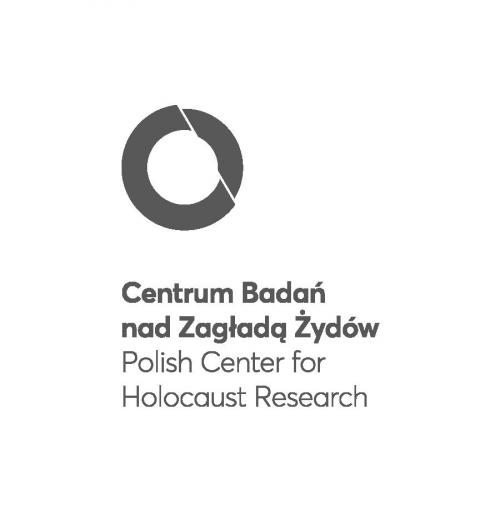
In its new phase, the EHRI project has 23 partners , of which 11 are new. In this article, one new partner, the Polish Center for Holocaust Research, introduces itself.
Article by Jakub Petelewicz
During the German occupation of Poland, the country became the stage for some of the worst atrocities of the Holocaust. It is estimated that nearly half of all of Europe’s Jews (and 90% of Poland’s own Jews) were killed during this horrific time.
The legacy of this dark chapter of history persists. Now, more than ever, we must ensure that the victims’ memories are honored through an ongoing tribute that gives them face. As custodians of their blessed memories, we owe them nothing less.
The Polish Center for Holocaust Research at the Institute of Philosophy and Sociology of the Polish Academy of Sciences was established in 2003 for this very purpose.
Dedicated to the study and analysis of this tragic history, the Center’s research projects make use of unique and previously untapped archives to illuminate the lives of those who died. Until now many of these precious documents had never been catalogued or translated. Today, thanks to the Polish Center for Holocaust Research, intimate details and insights into the lives of these martyrs are available for the first time.
About the Institute and the Center
The Institute of Philosophy and Sociology is one of foremost research centers of the Polish Academy of Sciences. The Institute’s primary objective is to carry out advanced research in philosophy and sociology as well as in cognitive and communication fields.
Apart from its research activity, the Institute is engaged in education, publishing and the popularization of science. Housed within the Institute of Philosophy and Sociology of the Polish Academy of Sciences is the country’s most prestigious scientific institution devoted solely to the study of the Holocaust, the Polish Center for Holocaust Research.
The Polish Center for Holocaust Research:
- Conducts research using a wealth of resources and collections unique to Polish archives.
- Coordinates interdisciplinary research projects.
- Offers and presents informational seminars led by top researchers.
- Publishes monographs, edited volumes, and unabridged source material.
- Supports scholarship programs and research workshops for students in order to create and inspire a new generation of Holocaust scholars and academics.
Members of the Center
The Center’s membership includes award-winning scholars representing a wide range of disciplines. These leading historians, psychologists, literary scholars, anthropologists and sociologists combine their methodological expertise to conduct and disseminate cutting-edge research.
- Barbara Engelking, PhD, psychologist, professor at the Institute of Philosophy and Sociology of the Polish Academy of Sciences, director of the Center since 2003, chair of the International Auschwitz Council since 2014, co-author of Holocaust Gallery in POLIN Museum of the History of Polish Jews Museum in Warsaw, co-author of The Warsaw Ghetto: A Guide to the Perished City, the most comprehensive scholarly work about the Warsaw Ghetto.
- Jan Grabowski, PhD, historian, professor of History of the Holocaust at the University of Ottawa, author of bestselling “Hunt for the Jews:” Betrayal and Murder in German-Occupied Poland.
- Agnieszka Haska, PhD, anthropologist, Jewish Historical Institute, author of the respected Hotel Polski Affair.
- Marta Janczewska, MA, historian of literature, Jewish Historical Institute.
- Jacek Leociak, PhD, historian of literature, professor at the Institute of Literary Research of the Polish Academy of Sciences, co-author of Holocaust Gallery in POLIN Museum of the History of Polish Jews in Warsaw.
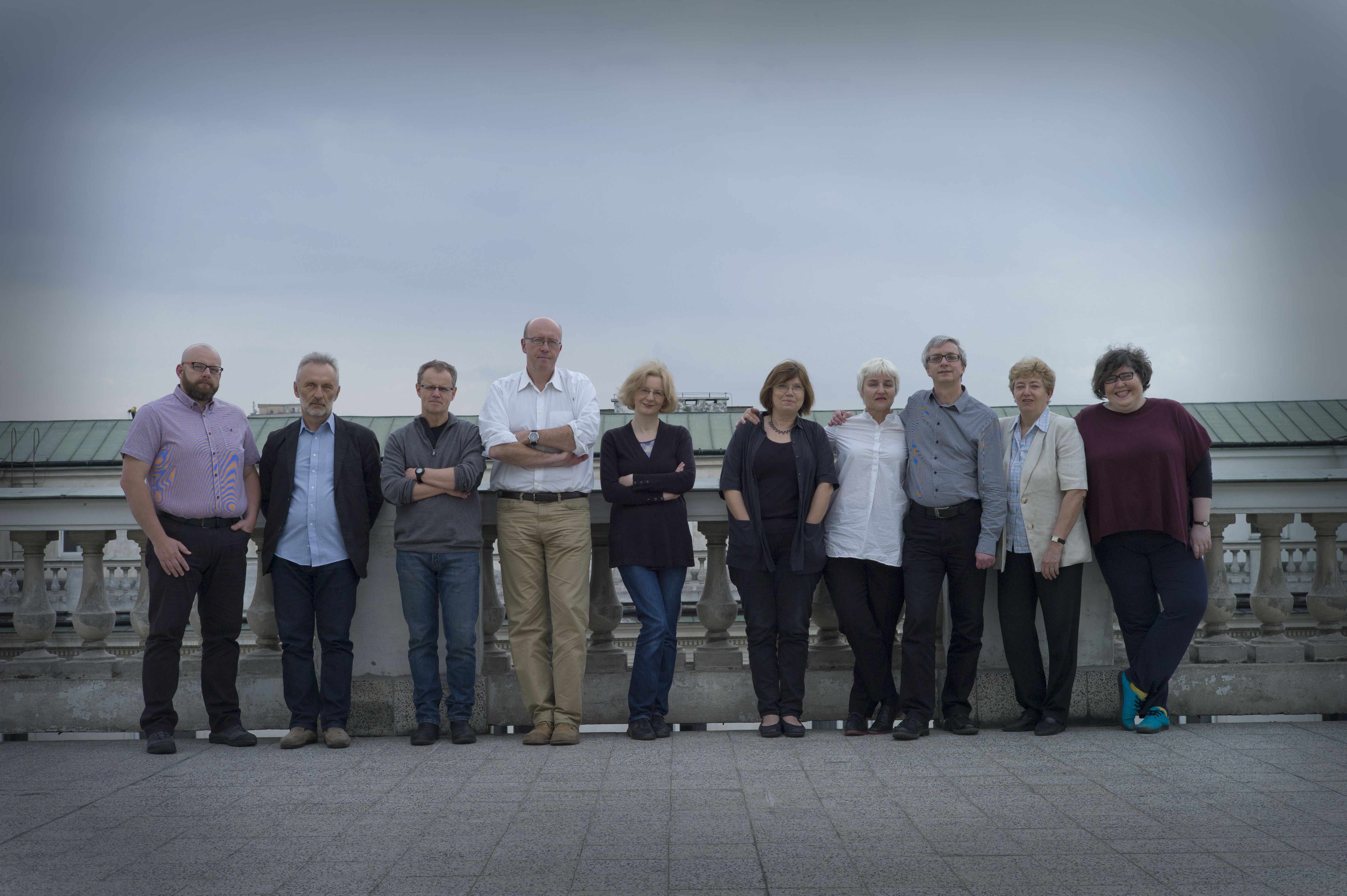 Dariusz Libionka, PhD, historian, associate professor at the Institute of Philosophy and Sociology of the Polish Academy of Sciences and State Museum of Majdanek.
Dariusz Libionka, PhD, historian, associate professor at the Institute of Philosophy and Sociology of the Polish Academy of Sciences and State Museum of Majdanek.- Małgorzata Melchior, PhD, sociologist, associate professor at the Warsaw University.
- Jakub Petelewicz, MA, historian, Institute of Philosophy and Sociology of the Polish Academy of Sciences, co-author of the initial concept of Holocaust Gallery in POLIN Museum of the History of Polish Jews.
- Alina Skibińska, MA, historian, United States Holocaust Memorial Museum, recipient of the Jan Karski and Pola Nireńska Prize, author of “Who cares if they did it out of greed?” The destruction of the Trynczers’ house.
- Andrzej Żbikowski, PhD, historian professor at the Warsaw University and Jewish Historical Institute.
The focus
At the Center our research and educational activities are designed to contribute to the fight against prejudice, xenophobia and anti-Semitism, and to aid in the creation of an open society.
- We analyze Holocaust history and focus on topics that have, until now, been avoided by scholars.
- We seek out previously-overlooked and unknown sources.
- We re-read and re-explore historical documents from a new and fresh perspective, utilizing a wide range of personal accounts in order to include the voices of the victims in the narrative.
- We are also involved in a series of important, path-finding studies that seek to shed light upon the attitudes of the so-called “bystanders” to the plight of the Jews at the time of the Shoah.
We further these goals through our journal, Holocaust. Studies and Materials (Zagłada Żydów. Studia i Materiały), a review that has quickly become an essential Holocaust-related publication.
Research projects
The Center’s goal is to reconstruct, in great detail, both the life and the destruction of Jewish communities during World War II. The results of our work have become an integral part of global research on the Holocaust, significantly expanding our collective knowledge of the German policies of extermination and pointing the attention of international scholars in new directions and lines of historical inquiry. To date, we have:
- Created a free online database (warszawa.getto.pl) of all the information on each known resident of the Warsaw Ghetto. The database is searchable along nominative, event-based and theme-oriented lines.
- Completed a several multi-year research projects, including: the Holocaust in Distrikt Warschau, the little-known topic of the fate of the Jews during the Holocaust in the rural areas of Poland and the plundering of Jewish property during and immediately after the war.
- Initiated an in-depth research study of Jewish survival strategies and the mechanics of the Holocaust in diverse counties of German-occupied Poland. This research project allows us to study several selected counties of occupied Poland using methods of micro-research that focus on individual Jewish experiences. Looking at the life (and death) trajectories of Jewish victims, and their interaction with members of the Polish mainstream society and the German occupiers, we are able to present the most complete depiction, to date, of the implementation of the German policies of destruction.
Publications
Since 2005, the Polish Center for Holocaust Research has published and widely disseminated more than 40 volumes of high quality, peer-reviewed research, edited materials and original sources.
In 2005, the Center initiated a new annual review, Zagłada Żydów. Studia i Materiały, now in its 12th edition. In order to disseminate this Polish scholarship to international academic audiences, key articles from this journal have also been translated into English (beginning in 2008) and published under the title Holocaust Studies and Materials.
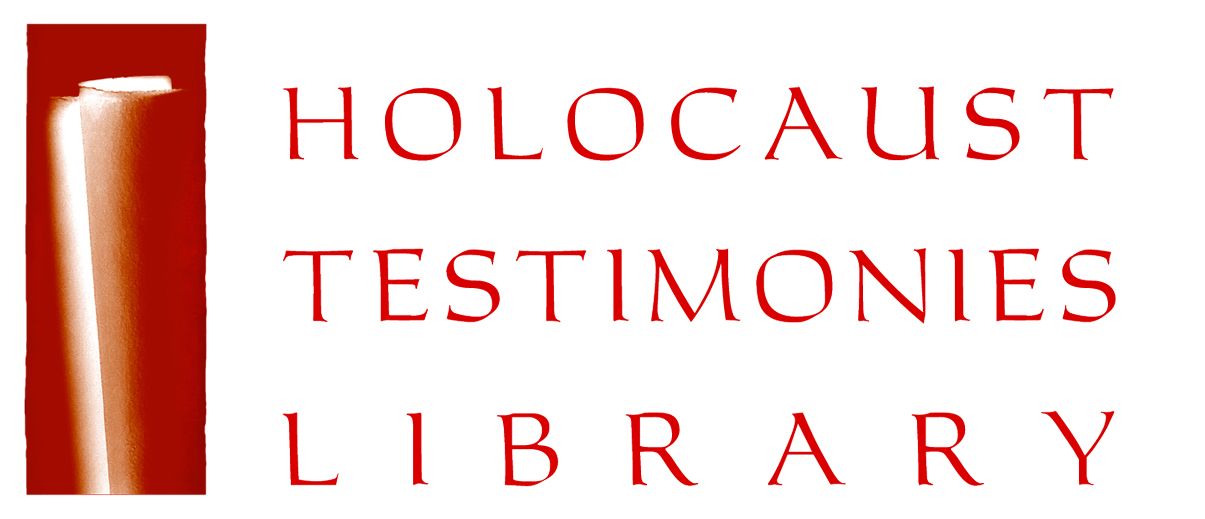 Biblioteka Świadectw Zagłady (The Library of Holocaust Testimonies) is a compilation of diaries written by victims and survivors during the Holocaust and memoirs written in the postwar era. It brings invaluable primary source material to a modern audience and adds a critical mass of the the victims’ voices to the historical debate. The series consists of six volumes to date, with another ten volumes planned.
Biblioteka Świadectw Zagłady (The Library of Holocaust Testimonies) is a compilation of diaries written by victims and survivors during the Holocaust and memoirs written in the postwar era. It brings invaluable primary source material to a modern audience and adds a critical mass of the the victims’ voices to the historical debate. The series consists of six volumes to date, with another ten volumes planned.
Our research projects are disseminated through an ongoing series of extraordinary, in-depth publications including:
- The Provinces, Night. The Life and Extermination of the Jews in the Warsaw District
- A Landscape Outline. Polish Countryside vs. the Extermination of Jews 1942-1945
- Keys & Cash. The Fate of Jewish Property in Occupied Poland, 1939-1945
- Barbara Engelking and Dariusz Libionka, Jews in the Insurrectionary Warsaw, 1944
- The history of the Jewish Military Union was rehabilitated and reconstructed by Dariusz Libionka and Laurence Weinbaum, Heroes, Hucksters, and Storytellers: On the Jewish Military Union (ŻZW)
- Barbara Engelking published her research on the fate of Jews seeking shelter in Polish villages in the 2011 volume: “It is such a beautiful sunny day…” The Fate of Jews Seeking Salvation in the Polish Countryside, 1942-1945 (French edition 2015, English edition 2016)
- Jan Grabowski analyzed the stalking and murder of Jews in hiding within Dąbrowa Tarnowska county: Hunt for the Jews. Betrayal and Murder in German- Occupied Poland (English edition 2013)
Since 2003, the NEGATIVA series, directed to popular trade-press distribution, deals with topics that, until recently, have been largely ignored by scholars, and have only now become objects of lively debate inside and outside academia. Dealing with such complex and little-studied moral issues as collaboration, complacency, blackmail and the murder of Jews at the hands of the local populations, the books explore the “blank spots” of public memory of the Holocaust:
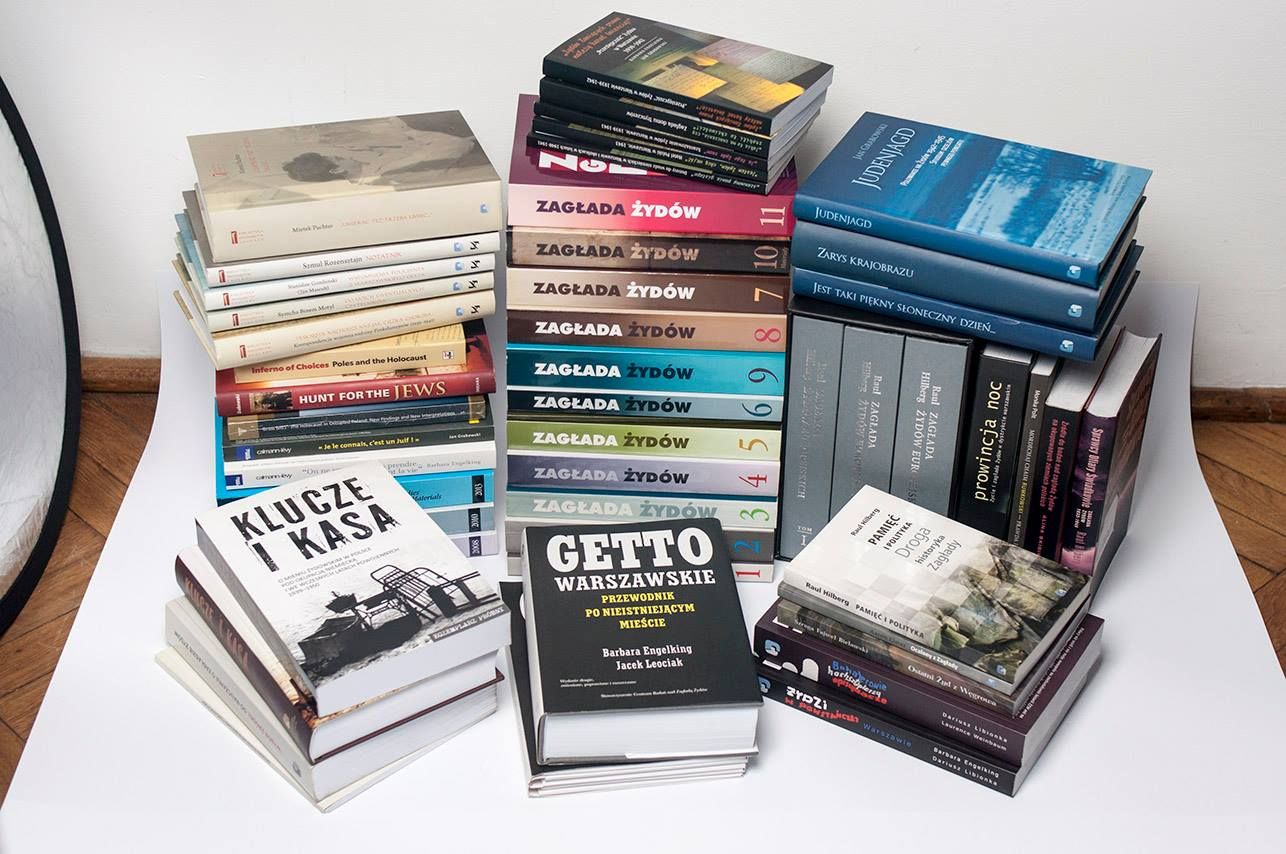 Barbara Engelking, “Dear Mr. Gestapo:” Denunciations to German Authorities in Warsaw and Surroundings 1940-1941
Barbara Engelking, “Dear Mr. Gestapo:” Denunciations to German Authorities in Warsaw and Surroundings 1940-1941- Jan Grabowski, “I know this Jew!” Blackmail of Jews in Warsaw, 1939-1943
- Agnieszka Haska, “I’m a Jew and I Want to Get In:” Hotel Polski Affair in Warsaw, 1943
- Barbara Engelking, Jan Grabowski, “Jewish criminals should be punished with death!” Criminalizing the Jews in Occupied Warsaw, 1939-1942
- Tadeusz Markiel, Alina Skibińska, “Who Cares If They Did It Out of Greed?” The Destruction of the Trynczers’ House
We have also published guides to sources that facilitate broader access to essential archival materials, including:
Alina Skibińska’s Guide to the Sources on the Holocaust in Occupied Poland, a guide to archival holdings at Polish and international repositories (translated into English and available on the EHRI portal)
Alina Skibińska and Robert Szuchta’s Selection of the Sources for the Holocaust Education in Poland, a two-volume publication of sources and accompanying lesson plans.
Other activities
Seminars and International Conferences
Since 2003, the Polish Center for Holocaust Research has hosted over 100 seminars and number of International Conferences for researchers to share their ongoing research with one another, to receive feedback and to further debate about the historical record. Seminars have included:
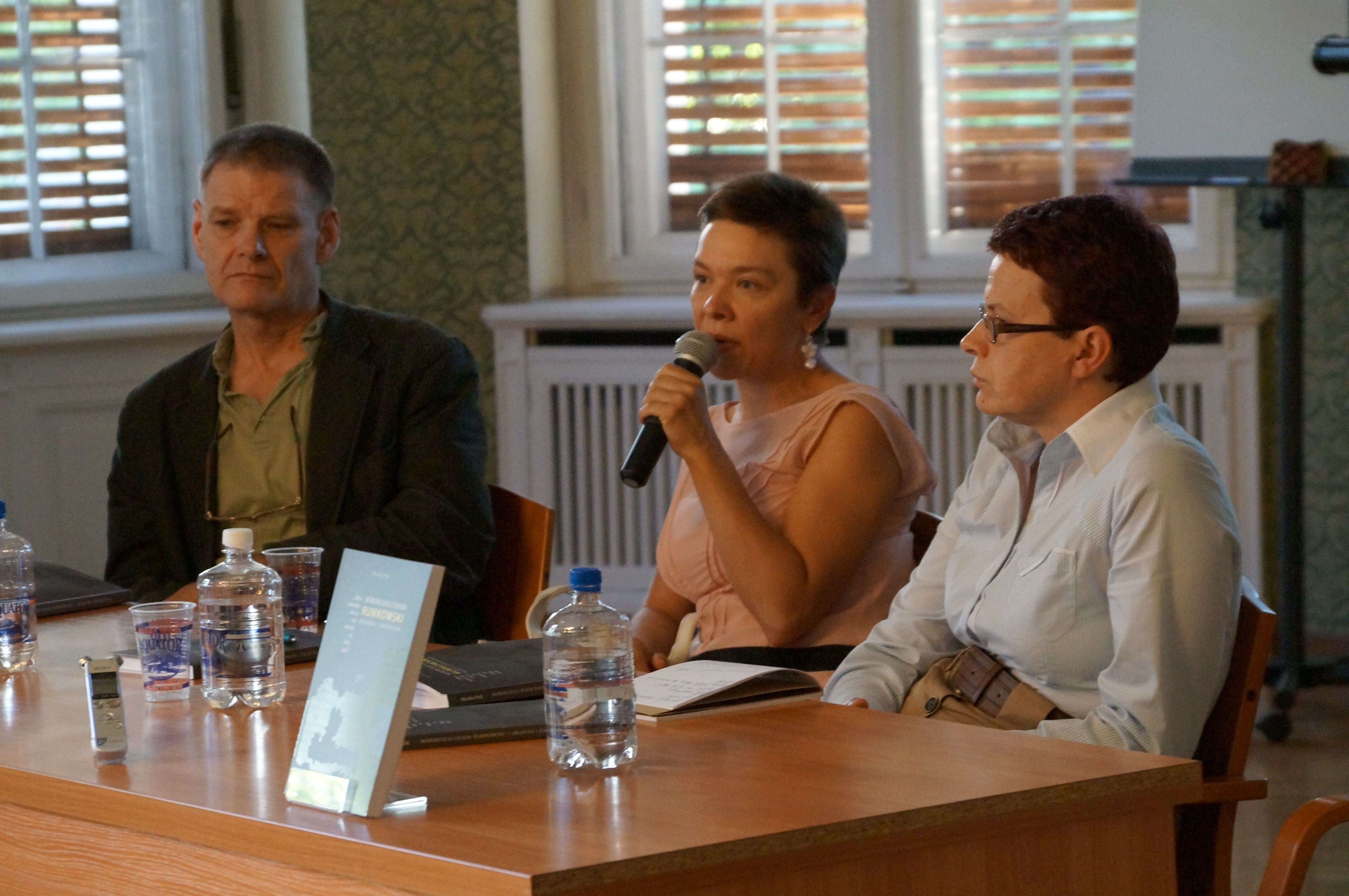 Meetings with Benjamin Meed and other Holocaust survivors.
Meetings with Benjamin Meed and other Holocaust survivors.- Witness Behavior during the Holocaust.
- The Holocaust: A Problem of God or of Mankind.
- The Jewish Military Union: Facts and Myths.
- Can Rudolf Hoess Be Saved? Or the Paradox of Forgiving the Unforgiveable.
- I Accuse Auschwitz: A Family History.
Academic Scholarships for Emerging Scholars
The Polish Center for Holocaust Research recognized a need to provide critical funding to assist young scholars at the Master’s Level to continue their studies and to pursue doctoral research in the field. In 2009, the Center awarded its inaugural scholarship for Holocaust research to Anna Wylegała for her project “The Holocaust in Żółkiew:” As Recalled in the Minds of Previous and Present Residents of the City of Żółkiew.
Since 2014, the Center has coordinated academic conferences, seminars and research workshops for PhD students from several Polish universities. These conferences provide a unique opportunity for networking, the exchange of research and ideas, the sharing of research methodologies and greater access to the ever-more accessible materials and tools and the Institute’s disposal.
"The scholarship and confidence the Center offered me, inspired my faith in the sense of what I was doing and opened a new research chapter. I found the experience of cooperation with the Center’s scholars extremely valuable, particularly their methodological and moral support in discovering the complex Polish-Jewish history."
Karolina Panz, Center’s Academic Scholarships for Emerging Scholars fellow
Images ©The Polish Center for Holocaust Research